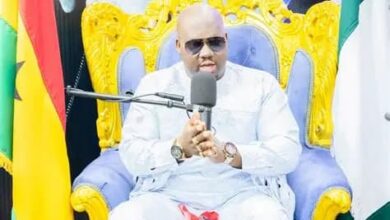I wish 24-Hour Economy could work, but I know it won’t—Kofi Bentil cast doubt

Private legal practitioner and vice president of policy think tank IMANI Africa, Kofi Bentil, has cast doubt over the implementation of the 24-hour economy.
He says he wishes it could work, but he knows that the program will not work, even though he wishes the government well in its implementation.
Kofi Bentil, who made this position known via a social media post, asked some questions about the programme, which was much touted during the 2024 campaign.
To him, the government needs to provide the country with an understanding of how it intends to get the money needed to support its implementation.
He is also asking for concrete deliverables, which will make economic sense of the expenditure.
“what are the concrete deliverables which will make economic sense of the expenditure? I mean, we know how much it will cost, so please tell us in the same clear terms how much we are getting from this expenditure, otherwise please dont spend the money,” he questioned.
Read His Comments Below
Campaign is poetry, governance is prose, meaning you can sweet talk and imagine great things when campaigning, but in government, you must deal with reality!!
Regarding the 24 Hour Economy,
(I wish it could work, but I know it wont!, I however wish the government well)
1st shot from the man in charge!
1. “You must have capacity utilisation if you want to run a 24-hour economy; that allows you to implement the three-shift economy”,
2. “and you must have qualitative products that are accepted and wanted by the market”.
3. “And you must be price-competitive”.
4. “The most important thing is that we achieve the levels of competitiveness, output growth that supports industry and traders to export”. … all quotes from Mr Tanoh.
QUESTIONS:
1, Do we?
2, Do we?
3, Are we?
4, Can we?
I also hear it will cost us about 6 BILLION DOLLARS????
That means 1.5 BILLION DOLLARS for each year of JM’s 4 YR. Presidency, (BTW 6 months is already gone so correct that to 1.7 BILLION DOLLARS for each year of the period left).
QUESTION:
Even if we have that money, would this be its best use? and we dont have that money, so are you saying we will borrow this money for this purpose?? and will we get all or part?? remember, a half blown balloon, wont rise half way up, it wont rise at all!! so are we in or out? you cant be partially pregnant, you are pregnant or you are not!!!
FINAL QUESTION
what are the concrete deliverables which will make economic sense of the expenditure? I mean, we know how much it will cost, so please tell us in the same clear terms how much we are getting from this expenditure, otherwise please dont spend the money!!
In the end, will we have probes to find where the money was wasted and who stole what, or we will see the clear benefits of the huge open ended expenditure??
I wish us all well because we rise or fall together, but I sincerely wont do this if it was me! of course it is not me at Jubilee so I can only pray ….
keep this post safe somewhere, we will read it again in about 4 years!
What Is 24-Hour Economy?
The National Democratic Congress’ (NDC) 24-hour economic policy is a game changer that aims to transform the Ghanaian economy by increasing enterprise and labour productivity in twelve priority sectors, thereby creating jobs to tackle significant unemployment challenges.
The policy is built on two pillars: stabilising the macroeconomic environment and supporting infrastructural development. Sound macro-economic management aims to lower inflation, ensure a stable Cedi, and lower interest rates.
Stable energy supply, improved road and transport networks, irrigation, and digital networks will be the focus of the NDC’s infrastructural development interventions.
Prioritised sectors include the following: Agro-Processing; Manufacturing; Pharmaceuticals; Construction; Financial Services; Extractive industries; Sanitation and Waste Management; Hospitality Industry; Retail Centres; Transportation Services; Health Services; and Security Services.
The how of the 24-hour economy policy is captured in the following five principal elements.
Incentives to stimulate productivity
The NDC government will provide incentives and support for businesses to operate and grow in the 24-hour economy. This will begin with expanding domestic demand for Made in Ghana goods and services through a review and update of our public procurement rules and local content regulations to give preference to locally made products.
This will be supported by the Brand Ghana Office to assist local producers to improve the quality and marketing of their products.
To strengthen and enhance government’s support for exporters to take advantage of foreign market opportunities, especially under the African Continental Free Trade Area (AfCTA) agreement, the President will himself chair an Accelerated Export Development Council to give it the needed impetus.
The NDC will also institute time-of-use electricity tariffs, which provide lower rates during off-peak hours to reduce the operational costs of businesses that participate in the 24-hour economy programme. Further, the NDC government will rationalise and expand existing technical and concessionary financing support for businesses. This will include updating and rolling out specific 24-hour economy financing products and services from existing institutions like the Ghana Enterprise Agency, GhanaEXIM Bank, Development Bank of Ghana, Ghana Venture Capital Trust Fund, Microfinance and Small Loans Centre, and Minerals Income Investment Fund.
These expanded financing schemes will be complemented by the Women’s Development Bank, FINTECH Growth Fund, Soyaaya Fund, and National Employment Trust to expand financing and technical assistance to businesses.
The NDC expects private financial institutions to leverage this enhanced and targeted provision of concessionary financing to businesses to expand their investment and lending to the identified priority sectors.
Enabling legal and regulatory environment
The NDC government will create the enabling legal and regulatory environment for the functioning of the 24-hour economy. To do this, we will update and pass the Labour Bill 2024 into an Employment Act that makes adequate provisions for shift work and fair work conditions for businesses and workers; update and pass the Consumer Protection Bill to ensure fair trade practices and consumer rights; and pass the Competition Act to promote fair competition and check anti-competitive practices, especially dumping of imported items on our market.
Local economic development
The NDC plans to link the 24-hour economy policy with local economic development to ensure all the sixteen regions of Ghana participate and benefit from the programme. We will develop and publish criteria for Metropolitan, Municipal and District Assemblies (MMDAs) to participate in the 24-hour economy programme including collaboration with the private sector. We will update our spatial planning and zonal guidelines and standards to incorporate the 24-hour economy, including defining agricultural, industrial and service zones for day and nighttime activity.
MMDAs that are selected to participate in the 24-hour economy policy will prepare and implement plans that cover the nature of economic activities, physical zones, infrastructure provision, safety and security, transport, markets, expected number and types of jobs created, private sector collaborators, environment, and social safeguards.
Clearing public service delivery backlogs
The NDC’s 24-hour economy policy will extend the working hours and service delivery channels for highly demanded public services that have a backlog of service requests, including driver and vehicle licensing; entity registration, filing, amendments, and search services; tax filing and payments, and tax clearance certificates; passport acquisition and renewal; lands registration and search; courts and administration of justice; and cargo import clearance and export forwarding at seaports. Under an NDC government, the respective public institutions will design and launch a 24-hour service that extends their back-office operations to operate round the clock and expands their digital channels for service delivery.
Security and public safety
Successful implementation of this policy requires a safe and secure environment free from crime and violence for day and nighttime work. The NDC government will therefore expand police visibility and community crime prevention programmes and collaborate with the private sector to develop and implement security plans for hubs identified for nighttime activity. The NDC government will resume the universal street lighting programme to improve visibility and safety for businesses and communities operating at night.
Cumulatively, the NDC’s Employment and Jobs Creation initiatives are projected to create over 1.7 million jobs for the masses of unemployed young people and women in Ghana.




